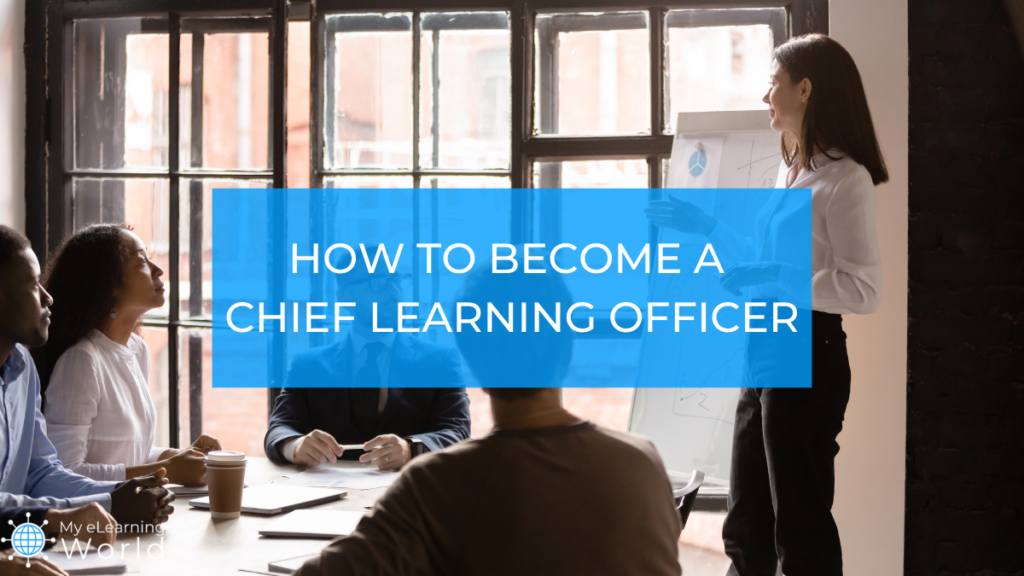Looking for clear, accurate info on how to become a chief learning officer? Want to pursue a career in this business education niche?
You’ve come to the right place.
The field of corporate learning and development has exploded in recent years as more and more companies are realizing the importance of investing in their employees. As a CLO, you’ll use your skills and expertise to ensure that the company is providing the best training possible for its staff, overseeing all learning strategies and talent development initiatives.
In the guide below, we’ll detail exactly what you need to do if you want to become a chief learning officer.
What is a Chief Learning Officer?
A chief learning officer (CLO) is a corporate executive responsible for overseeing the process of learning and development within an organization.
In many cases, chief learning officers report directly to the CEO or other senior-level executives, helping ensure educational programs align with the organization’s overall objectives.
The CLO’s primary goal is to ensure that the company’s employees have the knowledge and skills needed to be successful in their roles.
To achieve this, the CLO often works closely with other department heads, such as those in human resources and talent management, to create and implement training programs.
Additionally, chief learning officers may be responsible for managing the budget for learning programs and training initiatives.
While the position of CLO is relatively new, it has become increasingly important in recent years as companies increasingly recognize the importance of investing in employee development and training programs.
What Skills Do You Need to Become a Chief Learning Officer?
If you want to be a chief learning officer, there are certain skills you’ll want to have:
- Strong interpersonal skills: As a chief learning officer, you’ll need to be able to effectively communicate with a variety of different people, both within and outside of your organization. This includes being able to clearly articulate your ideas and vision for employee development programs to reach key business objectives.
- Organizational skills: An effective chief learning officer is highly organized and can easily manage multiple projects simultaneously. This includes being able to develop and stick to timelines and budgets.
- Analytical skills: A chief learning officer must be able to analyze data in order to assess the effectiveness of employee development programs and make necessary adjustments.
- Creativity: Chief learning officers are creative and can think outside the box when it comes to developing new employee development programs.
- Leadership skills: As a chief learning officer, you’ll need to be able to inspire and motivate others to buy into your vision for employee development and educational programs.
Step-by-Step Guide to Becoming a Chief Learning Officer
Because the position of chief learning officer is fairly new, there is no one specific path to becoming a CLO.
However, there are certain steps that you can take to increase your chances of being hired for this role.
Some of the things you can do to become a chief learning officer include:
1. Get a degree or certification in a related
The first step to becoming a chief learning officer is to get your bachelor’s degree or a professional certification in a relevant field. You might want a degree in education or even business administration.
Making the transition from teacher to chief learning officer can be challenging, but having a degree in education can be immensely helpful. With this kind of training and experience, one is well-prepared to understand the unique needs and challenges faced by educators in today’s world.
In particular, having a deep knowledge of curriculum design, classroom management strategies, and student assessment methods makes it easy to identify opportunities for improvement and develop effective strategies for tackling them.
Additionally, working as an educator provides a unique perspective on workplace culture, helping one to effectively lead teams and collaborate with other departments within the organization.
In short, having a degree in education can be invaluable for those seeking a career as a CLO, and it’s definitely something you’ll need to highlight on your chief learning officer resume.
Likewise, a business administration degree could also be a helpful stepping stone on the path to becoming a chief learning officer.
The skills learned in a business administration program—such as accounting, finance, marketing, and human resources—provide a solid foundation for understanding the inner workings of an organization.
In addition, business administration programs often include coursework in change management and organizational development, which can be highly relevant to the role of chief learning officer.
Furthermore, many business administration programs offer internship opportunities that can give students firsthand experience in the field.
For all these reasons, a degree in business administration can be a useful asset for anyone interested in becoming a chief learning officer.
You could also take the path of earning your business administration degree and then completing an alternative teacher certification program, combining the best of both worlds.
Another good option is to get a professional certification in a field like instructional design which will give you the skills necessary to design effective training materials.
 Emeritus Professional Instructional Design Certificate | Online Certificate Course
Emeritus Professional Instructional Design Certificate | Online Certificate Course
Gain firsthand expertise in instructional design principles and methodologies through this unique Professional Certificate program. Create impactful learning solutions and improve people's ability to learn.
The world of eLearning and instructional design is constantly evolving, and it can be difficult to know where to begin. Luckily, the Professional Certificate in Instructional Design program from Emeritus is here to help.
This comprehensive program covers everything from the basics of instructional design to popular instructional design theories and the best practices for implementing and iterating your courses and training materials.
Whether you’re a seasoned professional looking to enhance your skills or someone looking to break into the field of eLearning and corporate training, this 5-month course provides all the training you need to achieve your goals. Plus, with a certificate at the end of the program, you’ll be well on your way to launching your career in this exciting field.
You can learn more about the program and request a brochure at this link.
2. Get experience as a teacher
Whether you are a veteran educator or a recent graduate just starting out, gaining teaching experience can be an invaluable tool for becoming a chief learning officer.
By working with students at all grade levels and in diverse educational settings, you gain a valuable perspective on how different classrooms operate and what types of challenges teachers face. This can be invaluable in helping you better manage corporate learning programs when you become a chief learning officer.
Additionally, teaching experience gives you the opportunity to develop your leadership and communication skills, both of which are essential for effective CLO management.
As such, if you aspire to become a CLO, getting some time in the classroom or even as an instructional designer can help to prepare you for success in this competitive field.
3. Get administrative experience
The best chief learning officers aren’t just good educators, they’re also knowledgeable in business administration, human resources, and talent acquisition.
To that end, another way to prepare for a career as a chief learning officer is to get some experience working in an educational administration capacity.
This could involve working as a school administrator, instructional coordinator, or even educational consultant.
In these roles, you would gain valuable insights into the inner workings of an educational organization and learn how to effectively manage people and resources.
What’s more, you would also have the opportunity to develop your skills in strategic planning, program evaluation, and data analysis—all of which are essential for chief learning officers.
4. Consider a master’s degree
While a bachelor’s degree is typically the minimum requirement for becoming a chief learning officer, pursuing a master’s degree can give you a competitive edge in the job market.
There are a number of different types of master’s degrees that could be beneficial for chief learning officers, including degrees in education, business administration, and instructional leadership.
A master’s degree can help you to develop the advanced skills and knowledge needed to effectively lead a team of educators and support staff.
In addition, a master’s degree can also give you the opportunity to specialize in a particular area of education, such as curriculum and instruction, educational technology, or organizational leadership.
No matter what type of master’s degree you pursue, completing this advanced level of education can help you to stand out from the competition when seeking a chief learning officer position.
5. Seek out professional development opportunities
In addition to formal education, chief learning officers should also seek out professional development opportunities to stay up-to-date on best practices in the field.
One way to do this is to join a professional organization.
The best organizations offer a variety of resources for chief learning officers, including job boards, networking opportunities, and professional development events.
Additionally, many chief learning officers hold certifications from professional organizations, such as the Association for Talent Development (ATD).
You could even earn certifications by taking online courses from learning websites like Emeritus.
Earning a certification can show potential employers that you are serious about your career and committed to professional development, and they can help boost your chief learning officer salary.
What’s more, some certifications even offer the opportunity to specialize in a particular area of learning and development, such as instructional design or e-learning.
Additionally, chief learning officers can stay abreast of the latest industry trends by reading trade publications or blogs that cover the industry.
A Final Word on Becoming a Chief Learning Officer
A career as a chief learning officer can be extremely rewarding. Not only will you have the opportunity to help shape the future of your organization, but you will also be able to make a difference in the lives of employees.
As a chief learning officer, you will be responsible for identifying and developing training and development programs that meet the needs of employees.
Chief learning officers also play a key role in evaluating the effectiveness of these programs and making necessary changes.
In addition, you will be able to work with a variety of different people, including executives, managers, and HR professionals. This position provides an excellent opportunity for personal and professional growth.
If you are looking for a challenging and rewarding career, then a career as a chief learning officer may be the perfect choice for you.
By following the steps above, you can set yourself on the path to becoming a chief learning officer.
Have any more questions about how to become a chief learning officer? Leave us a comment below.


